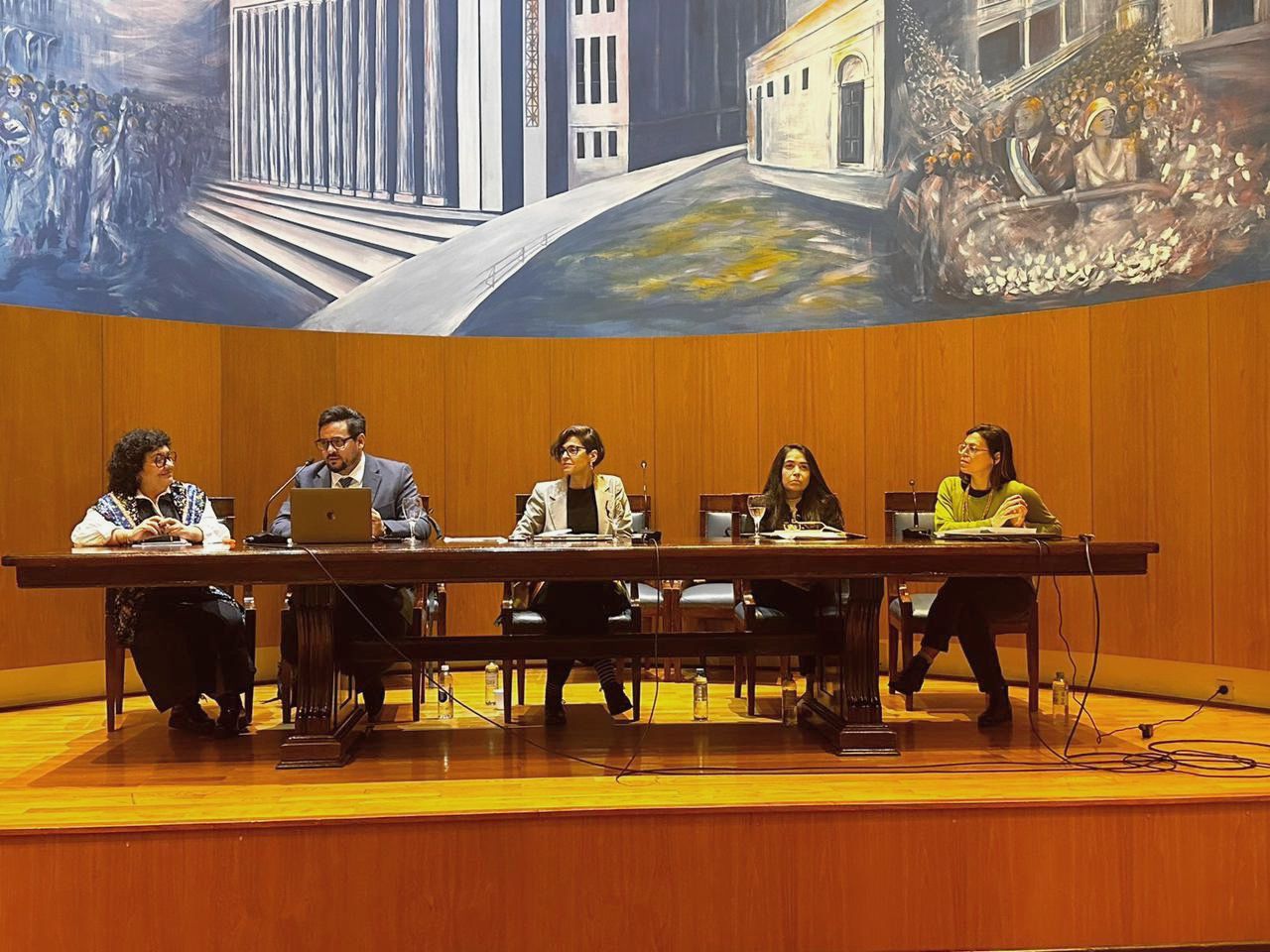As part of the academic visit to Argentina by international human rights referents -and following the publication of the new Advisory Opinion 32 of the Inter-American Court of Human Rights (IACHR), which establishes a new legal standard by stating that American States have the duty to address the climate emergency as a human rights obligation—, Fundación Ambiente y Recursos Naturales (FARN) organized two public discussions to reflect on the socio-environmental challenges of the energy transition amid the climate crisis and ongoing human rights violations.
The first event took place on July 7th, at the National University of Salta, co-organized with the university’s Master’s Program in Human Rights. More than 150 people attended, including representatives of Indigenous communities from Jujuy, Salta and Catamarca, environmental assemblies, civil society organizations and academic institutions.
The panel featured Fernanda Hopenhaym Cabrera, member of the UN Working Group on Business and Human Rights; Javier Palummo Lantes, Special Rapporteur on Economic, Social, Cultural and Environmental Rights of the Inter-American Commission on Human Rights; María Laura Castillo Díaz, coordinator of FARN’s High Andean Program; and Patricia Marconi, president of the Yuchán Foundation. Also participating were Indigenous representatives from the Salinas Grandes and Laguna de Guayatayoc basin (Salta and Jujuy), the native Atacameños del Altiplano de Antofagasta de la Sierra community (Catamarca), members of the Fiambalá Despierta Socio-environmental Assembly (Catamarca), and from the ProEco organization (Tucumán). The discussion was moderated by Rodrigo Solá, director of the Master’s Program in Human Rights at the National University of Salta.
Community and assembly members spoke about the rights violation occurring in their territories due to mining expansion under the current energy transition model. They demanded that their rights -especially the right to free, prior and informed consent- be respected. The technical experts emphasized the need for a comprehensive, socio-ecological transition that respects human rights and planetary boundaries, particularly highlighting the impacts of lithium mining on water and biodiversity.
The conversation continued on July 10th, in the Faculty of Law at the University of Buenos Aires (UBA), in an event co-organized with the university’s Center for Environmental Law and it’s Center for Human Rights, as well as the International Center for Political Studies of the National University of San Martin. This second gathering further deepened the debate on the challenges of a just energy transition in Latin America. Panelists included Fernanda Hopenhaym Cabrera, Javier Palummo Lantes and Verónica Gómez, judge of the IACHR. The panel was moderated by María José Alzari, an expert in the legal regime of natural resources and environmental law, and Pía Marchegiani, Deputy Executive Director of FARN.
Judge Verónica Gómez noted that the Advisory Opinion explicitly incorporates the role of Indigenous and community based knowledge, recognizing it as part of the best available science for decision-making. She added: “The Advisory Opinion refers to the prohibition of generating irreversible damage to the environment, as a prohibition that does not admit an agreement to the contrary.”
“This Advisory Opinion is key,” said Palummo during his remarks, “because it is sending a message to society as a whole -and to the legal community in particular– that international human rights law is ready to face these new challenges posed by the global crisis.”
The IACHR Rapporteur also stressed that this Advisory Opinion opens the door to imagining another energy transition: «We need a fair energy transition that distributes resources. It is not possible that the areas where the key resources reside are sacrifice zones«. He added that this transition “must be developed with a social justice lens and recognition of the rights of peoples,” warning that otherwise, «we run the risk of repeating the history and mistakes of extractivism that have led to a catastrophic deterioration of nature and human rights violations.
For her part, Hopenhaym emphasized that the new Advisory Opinion clearly establishes the responsibilities of companies and provides tools for them to respond in the area of human rights. “More than ever, companies must uphold their commitments on human rights and the environment, and comply with their obligations”.
FARN celebrates the academic visit of the UN Rapporteur and Expert and their messages of social justice, participation and a rights-based approach to energy transition. These discussions are especially relevant in a national and regional context marked by setbacks in human rights and environmental protection. We hope that this Advisory Opinion will be taken up by countries across the region and inspire meaningful actions to address the climate emergency in harmony with human rights and nature.
